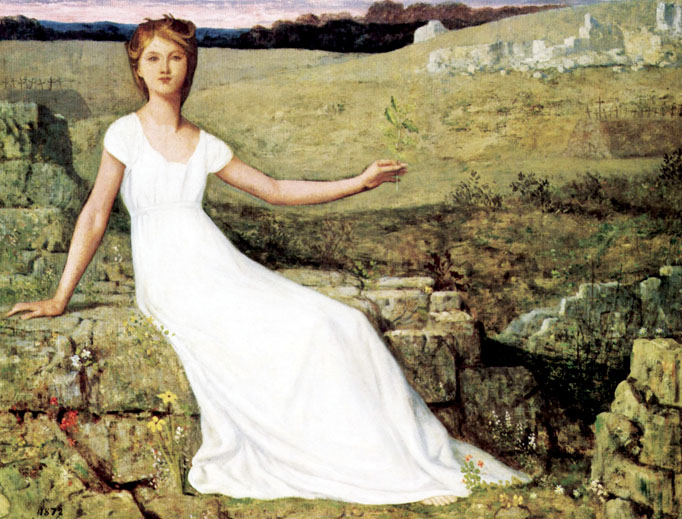Jane Austen for All Seasons
The Author’s Timeless Texts Speak to Modern Love and Life

Assistant professor Kathryn Davis teaches literature at the University of Dallas and is an avid reader and teacher of Jane Austen’s novels, one of which, Mansfield Park, is a part of the university’s core curriculum.
She spoke with the Register this summer about all things Austen — and what modern readers can glean from the British author’s timeless texts.
Love and Friendship is the latest Austen adaptation at the movies. Why do you think her popularity endures?
I think it’s really difficult to strike a balance of moral sense and humor, but she does. I don’t think I have laughed as hard as I have done when reading Jane Austen. At the same time, her moral sense is really apparent. Whit Stillman manages to capture both of these qualities in the latest adaptation.
One of the things I love about Austen is that she has something to tell us to help us understand our own situation — where we are and when we are. We can say “timeless.” I think that’s an accurate description of what she has left us.
Why do you enjoy studying and teaching Jane Austen?
I read Sense and Sensibility as a sophomore undergraduate, and I didn’t get it. I didn’t see what she was up to until I took Professor Theresa Kenney’s class as a graduate student at the University of Dallas. Theresa showed us that Jane Austen — from her earliest writings — had a keen sense of humor and keen insight into what makes us human beings “tick.”
I loved her “novel” in 12 chapters — sentences, really — called The Beautifull Cassandra, for her sister Cassandra. I thought it was really funny, but it was also clear to me from the beginning that she understood what makes a novel work. Her History of England also struck me as hilarious. Austen understood historical writing in the Georgian period and used that material to create a romp of a story. I was bowled over by how brilliant she was at a young age. Her early writing was extraordinary.
What do your students enjoy about her writing?
I have taught two novels: Persuasion and Mansfield Park. Mansfield Park is tricky; its comedy is different from that of other novels with witty heroines like Lizzy Bennet [in Pride and Prejudice] or Emma [in Emma]. Here [in Mansfield Park], the heroine is quiet and humble, and the “light and bright and sparkling” character, Mary Crawford, is really more like a “villain.” Most of my students have read the other novels and are perplexed by this inversion: The humor is with the morally unprincipled character. Some love it — but see how interesting and instructive it is to see that the funny and interesting character lacks a moral sense.
Persuasion is my favorite — I can’t get enough. I wrote my dissertation on Persuasion.
You’re working on a book about Jane Austen. What will readers learn from your scholarship?
My forthcoming book, Liberty in Jane Austen’s Persuasion (Lehigh University Press), is about Persuasion and the theme of liberty of soul understood as self-governance. There are fine studies like After Virtue (1981) that have come out on Austen’s ethics and devout Christian sense. My study explores ways in which Austen’s Christian faith influenced and shaped her way of thinking about political questions. In Persuasion, the hero, Capt. Frederick Wentworth, has the qualities needed for engaging in practical political leadership beyond a ship. My book focuses on the moral sense required for individuals to govern well.
Austen’s Christian morality comes through in her writing and her understanding of love, marriage and family life. How did her religious upbringing and faith influence her work?
I think, to be honest, she was constantly challenged by the obligation of her faith — not in a burdensome way. She seemed to struggle to balance her extraordinary wit, on the one hand, and seeing and reading characters — those she created and those in her family and larger circle of friends and community — charitably on the other.
A study — Jane Austen’s Anglicanism — suggested Austen knew she struggled with “witty malice.” Take the scene from Emma, on Box Hill, where Miss Bates says:
“‘Three things very dull indeed.’ That will just do for me, you know. I shall be sure to say three dull things as soon as ever I open my mouth, shan’t I?”
And Emma says, “Pardon me, but you will be limited as to number — only three at once.”
I’m sure Austen understood what Emma was going through — how it was hard to resist saying things. With her intellect and humor, it must have been a challenge to be sure she didn’t succeed in being uncharitable. Similarly, in Persuasion, the narrator is uncharitable, making fun of a grieving mother. People often get upset with the narrator, but I think it helps to see someone like Austen allowing the narrator to slip up. It shows the example of Anne Elliot over the narrator — a heroine who trumps her narrator, which does not usually happen. The narrator bows to her.
I think Jane Austen had a strong moral sense; she was a strong Christian, but like all of us, she struggled to live it well, to love others well. Her novels are refreshing and real.
Austen’s moral lessons and advice on love transcend time. What do modern women (and men) glean from her heroines’ (and heroes’) examples?
The heroines teach us the importance of building community and being part of it.
What would Austen’s advice be for relationships in 2016?
I think her bedrock principles would be the same: loyalty, virtue, chastity, authentic friendship, charity above all and honesty.
Describe Jane Austen’s writing in three words.
Keen/incisive; hilarious; timeless.
Amy Smith is the
Register’s associate editor.
Image: L’ESPÉRANCE BY PIERRE PUVIS DE CHAVANNES (1824-1898). WIKIPEDIA
- Keywords:
- Aug. 7-20, 2016



















